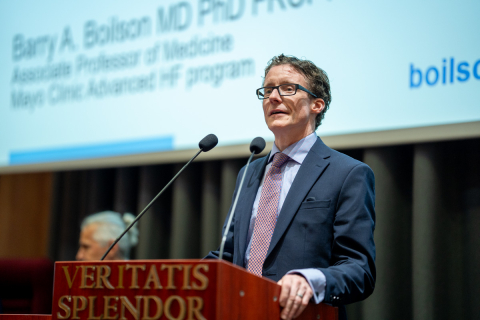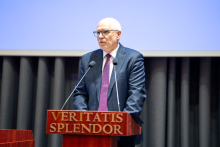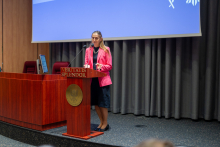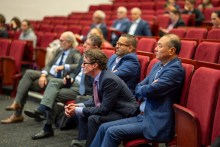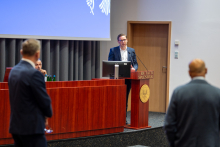“I consider this conference truly exceptional—not only from the perspective of a university rector but also as a clinician who has worked for many years in a university teaching hospital,” said Rector Prof. Rafał Krenke. “First, because it focuses on transplantation, a flagship area and a pillar of our university’s mission. Second, it represents an exciting new initiative—a bilateral inter-institutional meeting aimed at education and the exchange of experience. I sincerely hope that this conference will not only serve as a platform for presenting the latest achievements but will also foster collaboration, inspire new ideas, and build lasting relationships, potentially paving the way for regular future meetings.”
New therapies and treatment strategies
The main focus of the event was on modern approaches to liver, kidney, and heart transplantation that enhance outcomes and patient prognosis. Discussions also included emerging immunologic strategies and anti-cancer therapies, coordinated patient care, transplantation in patients with coronary artery disease, and future developments in the field of transplantology. Each lecture was followed by a discussion with the audience.
Presenters included:
- From Mayo Clinic:
Barry A. Boilson, MD, with the lecture titled “Cardiac Transplantation in 2025 – a Transatlantic Perspective”;
Timucin Taner, MD, PhD, with two lectures: “Cell therapies in transplantation” and “Liver-mediated immunemodulation”;
Mikel Prieto, MD with the lecture titled “KTx”;
Arkadiusz Z. Dudek, MD, PhD with the lecture titled “ICI in transplantation”;
Aleksandra Kukla MD with two lectures: “How I follow transplant recipient treated with ICI for malignancy – nephrology perspective” and “Hyperglycemia and kidney/pancreas transplant”;
Diwan Ty with two lectures: “Obesity surgery and transplant” and “Ethics and transplant”;
Naim Issa, MD with the lecture titled “Update on Antibody-Mediated Rejection of Kidney Allografts: Focus on New Therapies”;
Nelson Leung, MD with the lecture titled “Latest updates on monoclonal gammopathy of renal significance”. - From MUW:
Maciej Krasnodębski, PhD with the lecture titled “Split OLT”;
Prof. Michał Grąt with the lecture titled “Living related OLT”;
Prof. Zbigniew Gałązka with the lecture titled “KTx in patients with vascular problems”;
Zuzanna Jakubowska with the lecture titled “Glycemic management in transplant recipients role of CGM”;
Prof. Krzysztof Mucha with the lecture titled “Coordinated care in Tx”;
Prof. Jolanta Małyszko with the lecture titled “Thrombotic microangiopathy, not just TTP anymore”.
Day one lecture sessions were chaired by Prof. Maciej Kosieradzki and Prof. Bartosz Foroncewicz. Day two sessions were chaired by Prof. Magdalena Durlik, Prof. Joanna Raszeja-Wyszomirska, and Prof. Sławomir Nazarewski.
Advances in transplantation techniques, assistive devices, and therapies
“For patients with advanced heart failure, transplantation remains the gold standard of treatment. However, our practices have evolved regarding donor availability and expanding access for patients who previously did not qualify for transplant,” emphasized Dr. Barry A. Boilson, a cardiologist specializing in advanced heart failure and cardiac arrhythmias.
He discussed, among other topics, devices that extend the viability of donor organs up to 12 hours, immunosuppressive therapies used at Mayo Clinic, and advanced left ventricular assist devices (LVADs).
Prof. Michał Grąt presented a pioneering program involving adult recipients receiving liver grafts from living donors, launched in October last year at the Department of General, Transplant, and Liver Surgery at MUW’s University Clinical Center. This program expands organ availability and reduces transplant waiting times.
“The advantages of living donor transplants and the reasons we sought to introduce them in Poland are well known. This is the highest-quality transplant,” emphasized Prof. Grąt. “We are now treating liver transplants from living donors as scheduled procedures. Oncology patients are eligible. We can thoroughly prepare for the transplant, minimize cold ischemia time, and likely reduce the risk of rejection. The main drawback of the procedure is the potential for complications in otherwise healthy donors, which is why proper qualification of living donors is a top priority.”
Dr. Naim Issa, a nephrologist, transplant specialist and consultant at Mayo Clinic, delivered a lecture on the role of genetic testing in kidney transplant candidates and their potential donors. He reviewed the latest scientific findings and shared Mayo Clinic’s practical experiences implementing genetic testing in clinical transplantation.
“In recent years, our understanding of genetic kidney diseases has significantly advanced. This is crucial in the transplant setting because knowing the cause of kidney disease impacts patient management,” explained Dr. Issa. “In selected patients, genetic testing can provide valuable information—for example, to better estimate recurrence risk or screen potential blood donors. However, such testing should not be used to exclude patients from the transplant list or to disqualify candidates.”
Admission to the event was open to all those interested in this fascinating field of medicine.
